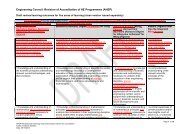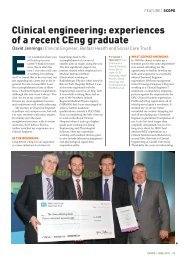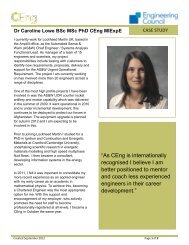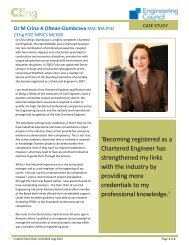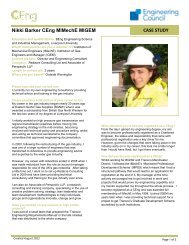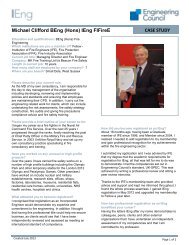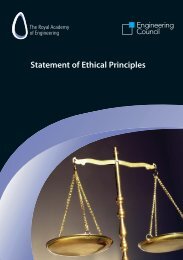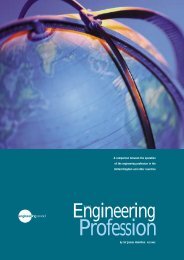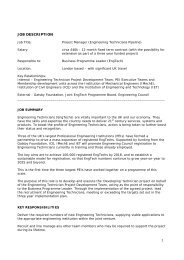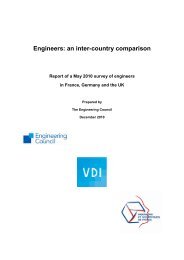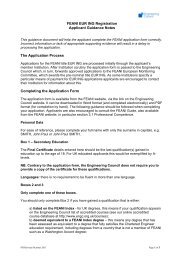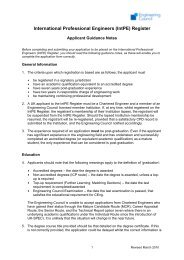An Engine for Change - A Chronicle of the Engineering Council
An Engine for Change - A Chronicle of the Engineering Council
An Engine for Change - A Chronicle of the Engineering Council
Create successful ePaper yourself
Turn your PDF publications into a flip-book with our unique Google optimized e-Paper software.
1999-2001: THE HAWLEY YEARS 145The last item, expressing determination to optimize its own per<strong>for</strong>mance, was to be achievedby implementing and sustaining <strong>the</strong> Senate-endorsed findings <strong>of</strong> <strong>the</strong> Activity Review andsubsequent reviews.It can be argued that this statement <strong>of</strong> Aims and Commitments represented only a palereflection <strong>of</strong> <strong>the</strong> MOU with Government [<strong>An</strong>nex G]. But even if this plan had been adheredto within <strong>the</strong> existing framework <strong>for</strong> <strong>the</strong> EngC, <strong>the</strong>re might have been no need <strong>for</strong> <strong>the</strong> breakupthat was soon to follow. In <strong>the</strong> event, after <strong>the</strong> Activity Review and o<strong>the</strong>r major upheavals,as we shall explain later, WISE, Neighbourhood <strong>Engine</strong>ers, Young <strong>Engine</strong>ers <strong>for</strong> Britain and<strong>the</strong> EngC Examination were all devolved to o<strong>the</strong>r organizations.Careers StrategyAs a consequence <strong>of</strong> earlier discussions as to whe<strong>the</strong>r <strong>the</strong> EngC should provide a careersservice, a feasibility study was undertaken by <strong>the</strong> BEP to determine whe<strong>the</strong>r a pan-pr<strong>of</strong>essionservice was needed <strong>for</strong> engineering and technology. In<strong>for</strong>mation explaining <strong>the</strong> aims <strong>of</strong> <strong>the</strong>study was sent to <strong>the</strong> <strong>Engine</strong>ering Institutions, National Training Organisations (NTOs), TheRoyal Academy <strong>of</strong> <strong>Engine</strong>ering and <strong>the</strong> <strong>Engine</strong>ering Employers’ Federation.The Stage 1 report <strong>of</strong> <strong>the</strong> feasibility study, which examined and identified <strong>the</strong> levels <strong>of</strong> such apan-pr<strong>of</strong>ession service, was well received by <strong>the</strong> many stakeholders and organisations. Workon Stage 2 during 2001 resulted in discussions with o<strong>the</strong>r stakeholders <strong>for</strong> <strong>the</strong> first ever Pan-Pr<strong>of</strong>essional Careers Conference planned <strong>for</strong> February 2002 and organized by <strong>the</strong> EngC,EMTA, and <strong>the</strong> National Institute <strong>for</strong> Careers Education and Counselling.PeopleIn February 1999 John Battle, Minister <strong>of</strong> State <strong>for</strong> Energy and Industry at DTI, in responseto an earlier invitation from Alan Rudge, attended a meeting <strong>of</strong> Senate and announced £1.5msupport <strong>for</strong> <strong>the</strong> pr<strong>of</strong>ession over <strong>the</strong> following three years; much <strong>of</strong> this was <strong>for</strong> <strong>the</strong> Campaignto Promote <strong>Engine</strong>ering (CPE) [see Chapter 6] and <strong>the</strong> National Marketing Campaign, butconditional upon CPE finding at least 50 patrons and <strong>the</strong> National Marketing Campaignreceiving substantial support from industry. Dr Rudge received <strong>the</strong> President’s Award from<strong>the</strong> Duke <strong>of</strong> Kent in 1999 and in <strong>the</strong> New Year Honours <strong>for</strong> 2000 he was knighted <strong>for</strong>services to engineering.At <strong>the</strong> end <strong>of</strong> 1999 15 Senate members (14 <strong>of</strong> whom had been elected in 1996 and one in1999) retired; four were <strong>the</strong> last survivors <strong>of</strong> <strong>the</strong> “initial group” who transferred to <strong>the</strong> newSenate from <strong>the</strong> “old” EngC <strong>Council</strong> at <strong>the</strong> end <strong>of</strong> 1995. Seven <strong>of</strong> <strong>the</strong> Senate were re-elected<strong>for</strong> a fur<strong>the</strong>r three years. Two Senate members (Sir Ian Robinson and Pr<strong>of</strong> Bob Boucher)appointed by <strong>the</strong> Privy <strong>Council</strong> retired; Sir Michael Lickiss (who had retired at <strong>the</strong> end <strong>of</strong>1998) had still not been replaced. The Privy <strong>Council</strong> appointed Major General David Judd,<strong>for</strong>merly <strong>of</strong> REME, and Lord Puttnam, an Oscar winning film producer and Chairman <strong>of</strong> <strong>the</strong>National Endowment <strong>for</strong> Science, Technology and <strong>the</strong> Arts and Chairman <strong>of</strong> <strong>the</strong> GeneralTeaching <strong>Council</strong>.Robin Wilson, Chairman <strong>of</strong> <strong>the</strong> Board <strong>for</strong> <strong>Engine</strong>ers’ Regulation, also retired at <strong>the</strong> end <strong>of</strong>1999 having successfully presided over <strong>the</strong> preparation <strong>of</strong> SARTOR-3 and many o<strong>the</strong>rregistration matters. He was succeeded by Pr<strong>of</strong>essor Patrick Dowling, a Senate member,© <strong>Engine</strong>ering <strong>Council</strong> UK 2004



